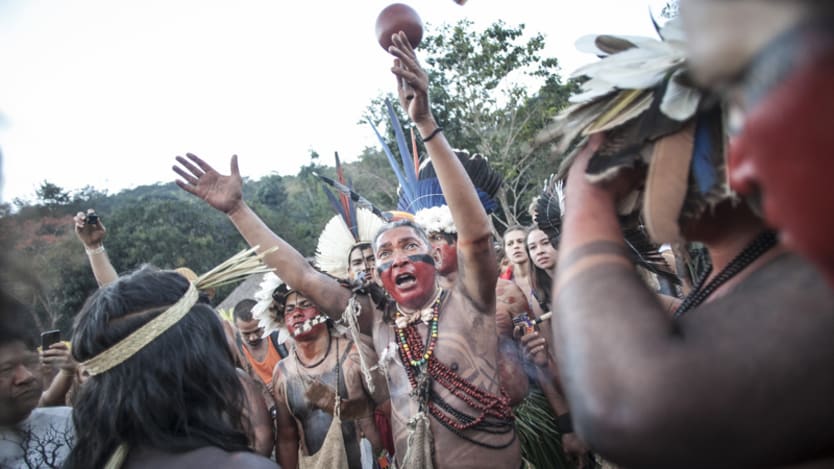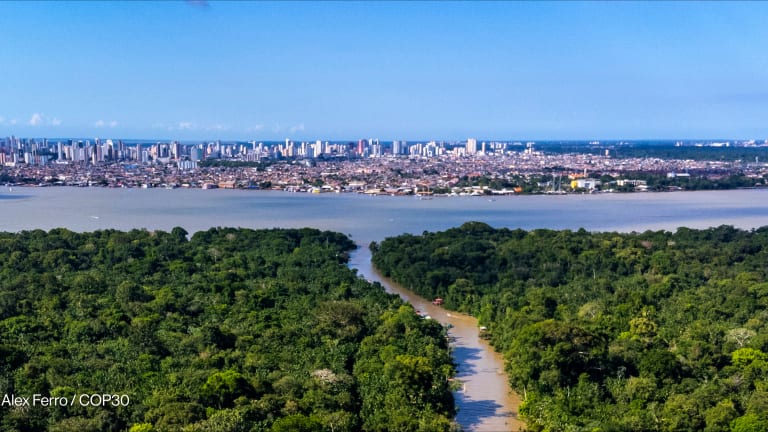
An indigenous leader has called on the international community to help protect his group’s ancestral home in the Amazon, as campaigners say indigenous land rights are under threat from the policies of the new Brazilian government.
Chief Tashka Yawanawa, leader of the Yawanawa indigenous tribe of approximately 1,000 people who live in the rainforest in the state of Acre in western Brazil, said he fears the government will take away his community’s territory to make way for agribusiness.
Yawanawa said this would be the equivalent of “genocide” for his people and a disaster for the rainforest they protect.
Indigenous groups have a better record of preserving the rainforest than other landowners.
— Chief Tashka Yawanawa, leader of the Yawanawa indigenous tribeThe international community needs to pressure the government to maintain commitments to protect indigenous land rights, he said, or it risks losing the rainforest as well as his community’s culture. He said indigenous groups have a better record of preserving the rainforest than other landowners.
Responsibility for dealing with land disputes between indigenous people and others has recently been transferred from a specialist indigenous protection agency to the Ministry of Justice, and campaigners say incidents of violence against land rights activists have also increased.
“It’s a time of struggle for indigenous people … We are losing [our] rights, especially about land,” Chief Tashka said. He claimed that “this new government is controlled by agribusiness and the intention is to exploit our territory for logging, mining, getting minerals. If the land is taken away … it will be genocide for indigenous people.”
“It is the responsibility of the international community to help us preserve the land,” he added.
The chief’s comments come after violent clashes between indigenous groups and police in Brazil’s capital last month during a protest over land rights. In May, the Guardian also reported brutal attacks by Brazilian farmers on an indigenous settlement in a dispute over land rights.
Indigenous peoples push for permanent seat at UN
Indigenous leaders and representatives worldwide are convening at this year's United Nations Permanent Forum on Indigenous Issues, which runs through May 5. One issue they are lobbying for is regular access to the U.N. and a seat at the General Assembly.
The attack prompted calls from the United Nations for Brazilian President Michel Temer to address the alarming levels of violence against land rights activists. Quoting government figures, the U.N. High Commissioner for Human Rights Zeid Ra'ad al Hussein said that 61 land rights activists were killed in the country in 2016.
Beto Borges, director of the communities initiative at Forest Trends, an NGO that works with the Yawanawa and other tribes to secure their territories and develop livelihoods that conserve the rainforest, said that the violence has escalated since the pro-business president came to power last year.
“Indigenous rights in Brazil at this moment are very much threatened. The agribusiness sector has always questioned the rights of indigenous peoples to their land and in this administration they have the backing of the federal government to really try to undermine gains that have been secured by indigenous peoples [after] many years,” Borges explained.
The right of indigenous people to occupy their traditional land was first recognized by the Brazilian Constitution when it was rewritten in 1988, after the end of the military dictatorship. The constitution promised to demarcate and protect those lands through the National Indian Foundation, or FUNAI.
However, the demarcation process has been slow and controversial, meaning that only 13.8 percent of Brazil is currently set aside as indigenous land, mostly within the Amazon region. The country is home to 900,000 indigenous people from about 240 tribes, of whom 517,000 live on these officially-recognized lands. Furthermore, no new land has been demarcated since August 2016, when Temer came to power.
Now, the demarcation process — including land already recognized as belonging to tribes — is facing a new threat, according to campaigners, after the government decided to transfer responsibility for settling such land disputes from FUNAI to the Ministry of Justice.
Leaders including Chief Tashka — whose land is demarcated — and campaigners say they fear the government’s decree, known as Ordinance 80, will enable it to take control of the demarcation process, with the risk that more land will be given to agribusiness interests.
However, the government says it simply wants to speed up demarcation.
In addition, the head of FUNAI, Antonio Costa, was recently dismissed and replaced by a military official for the first time in 25 years. Chief Tashka said this is a concern, since the military is “always against demarcations.”
“We are losing a lot of rights, rights that we [have been] fighting for for so long … They are stepping back from many things and we are worried because we cannot see a lot of future,” he said.
Read more international development news online, and subscribe to The Development Newswire to receive the latest from the world’s leading donors and decision-makers — emailed to you free every business day.


